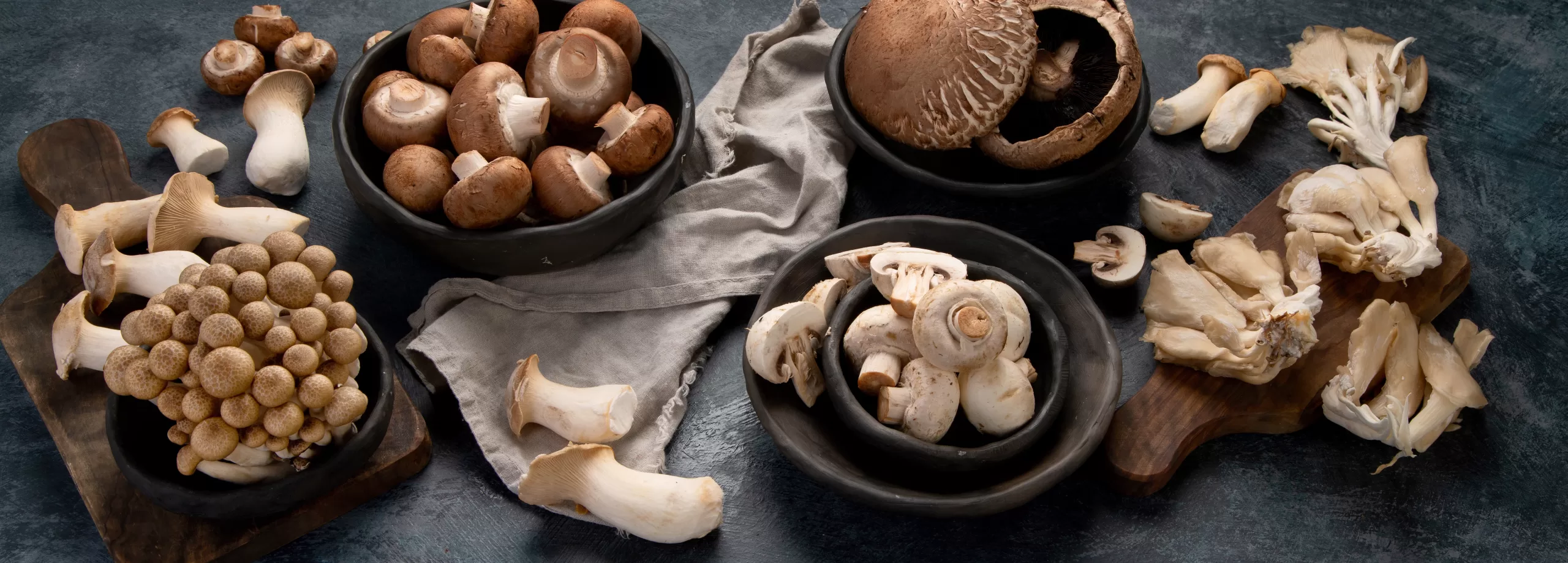
“Integrative Nutrition: Mushrooms as Medicine”
Today’s Dietitian, March 2020 issue, by Jamie Santa Cruz
I was interviewed for Today’s Dietitian magazine on how I use clinically studied medicinal mushrooms in my nutrition practice. Mushrooms have unique properties that support the immune system. In my practice I use Turkey Tail mushroom supplements with clients who have a strong family history of cancer or who have (or have had) cancer themselves. Below is the article:
“Do mushrooms’ potentially health-promoting compounds have a place in disease treatment?
Mushrooms have been used as medicine for thousands of years, including in the early Greek, Egyptian, Roman, Chinese, and Mexican civilizations.1 Although medicinal use of mushrooms has only recently begun to take off in the United States, new research suggests that mushrooms indeed may be a potent remedy for a variety of health conditions.
The term “medicinal mushroom” usually refers to more exotic, specialty mushrooms, says Robert Beelman, PhD, a professor emeritus of food science and director of the Center for Plant and Mushroom Foods for Health in the Pennsylvania State University College of Agricultural Sciences. But even the common white button mushroom widely eaten in the United States still has some medicinal value. A medicinal mushroom “is any mushroom that has medicinal properties, and that would be true of all mushrooms,” Beelman says.
Nutrition and Bioactive Components
Although mushrooms often are classified as vegetables for the purpose of dietary recommendations, they’re neither plants nor vegetables, but rather fungi. They’re relatively high in protein, with each 100-g serving of white button mushrooms containing about 3 g protein.1 In addition, mushrooms are an important source of carbohydrates, which compose about one-half of mushroom dry matter. Specifically, mushrooms contain chitin, a form of dietary fiber found in the exoskeletons of insects and crustaceans but not in plants. In addition, mushrooms contain beta-glucans and other polysaccharides, which are bioactive compounds that stimulate the immune system1,2; beta-glucans traditionally have been the primary focus of medicinal interest in mushrooms. Some species of mushrooms are much richer in beta-glucans than others (oyster and enoki contain relatively high amounts; white button and maitake contain much less).1 Mushrooms of all types are low in calories, very low in fat and sodium, and cholesterol-free.
What’s more, mushrooms are high in several key vitamins, including the B vitamins riboflavin (B2) and niacin (B3). They contain only low amounts of vitamin B12, but the form of B12 found in mushrooms appears to be highly bioavailable.1 Unlike plant foods, mushrooms can be a good source of vitamin D if they’re exposed to ultraviolet light.3 Mushrooms also are important sources of various minerals, including potassium, phosphorus, and selenium (the latter of which is an excellent antioxidant).
Finally, mushrooms are important sources of two other bioactive compounds, namely the antioxidants glutathione and ergothioneine.4 Although glutathione can be found in significant amounts in other foods, mushrooms are one of the only significant dietary sources of ergothioneine. According to Beelman, ergothioneine has received significant attention in recent research as a potential key to good health and longevity. “All mammals, including humans, make a genetically coded, highly specific transporter for this molecule,” suggesting an important role in the functioning of the human body, Beelman says. “Red blood cells distribute it around the body, and it tends to accumulate in tissues that are under the most oxidative stress, because it’s an antioxidant. This kind of indicates that the body wants to use [ergothioneine] as a defense against oxidative stress and inflammation.” Porcini, king oyster, maitake, oyster, and shiitake are the mushroom varieties with the highest amounts of ergothioneine; standard white button mushrooms contain much lower quantities.1,5
Medicinal Properties and Health Benefits
According to Solomon P. Wasser, PhD, a professor emeritus in the department of evolutionary and environmental biology at the University of Haifa in Israel, mushrooms and other fungi are thought to possess more than 200 different medicinal functions. They have antitumor, immunomodulating, antioxidant, radical scavenging, antiviral, antibacterial, antifungal, hepato-protective, and antidiabetic effects, among other qualities. In turn, mushroom consumption is thought to impact the risk of a range of conditions and diseases. “I have changed the English proverb,” Wasser says. “Instead of apples, ‘One mushroom per day keeps the doctor away.’”
Cancer
According to Wasser, some of the best evidence for the benefit of medicinal mushrooms relates to cancer.6 “Medicinal mushrooms are especially important for the prevention and treatment of oncological diseases,” Wasser says. “There are real drugs from medicinal mushrooms—for example, krestin, lentinan, schizophyllan—that are being used especially in Asia (Japan, Korea, China) for treatment in different kinds of cancer. Mushroom compounds are very important as immunomodulators that enhance our immune system.”
Much of the research on mushrooms and cancer has focused on breast cancer. Test tube experiments have isolated specific compounds from different species of mushrooms and have shown that they inhibit breast cancer growth.7,8 In addition, a meta-analysis of 10 different observational studies found that increased mushroom intake was associated in a dose-dependent manner with lower risk of breast cancer in both pre- and postmenopausal women.9
There’s also significant interest in mushrooms as a treatment for liver cancer, especially hepatocellular carcinoma. Test tube experiments as well as studies in mouse models have shown that polysaccharides and other compounds extracted from various species of mushrooms inhibit liver cancer cell proliferation and suppress tumor growth and metastasis, among other beneficial actions.7
Research also suggests that certain kinds of mushrooms may be effective against other types of cancers, including uterine cervical cancer, bladder cancer, leukemia, and gastric cancer.7 On a cautionary note, however, a prospective study of two large US cohorts published in 2019 found no association between mushroom consumption and either total cancer incidence or incidence of site-specific cancers, suggesting the need for additional research to tease out the precise impact of specific mushrooms on various cancers in different population groups.10
Cognition and Neurodegenerative Disease
An experiment in mice found that mushrooms enriched with ergocalciferol protected against beta-amyloid peptide toxicity in the brain and against mild cognitive impairment, both of which are precursors to dementia. In human populations, epidemiologic studies in Singapore and Japan have found that mushroom consumption is associated with reduced risk of mild cognitive impairment and dementia.11,12 Clinical trials are limited, but one small trial in elderly Japanese subjects found that oral administration of lion’s mane (Hericium erinaceus) mushroom powder helped improve mild cognitive impairment. Preclinical evidence also suggests that mushrooms may offer protection against other neurodegenerative disorders, including Parkinson’s disease.13
According to Beelman, these effects likely are due in part to the high levels of ergothioneine in mushrooms.4 Lower levels of ergothioneine have been associated with increased risk of cognitive decline and Parkinson’s disease.14,15 By contrast, uptake of ergothioneine in the brain appears to decrease oxidative stress, which may reduce symptoms of neurological disease.16
Cardiometabolic Disease
Both preclinical and clinical studies suggest that mushroom consumption may help to protect against obesity, heart disease, and type 2 diabetes.17,18 Various studies in test tubes, animal models, and human subjects have suggested that mushrooms can reduce inflammation, cholesterol, blood pressure, and blood glucose, and can block the formation of fatty plaques in the arteries.7,19-27 These effects have been linked to various bioactive compounds in mushrooms, including beta-glucans and other polysaccharides as well as ergothioneine.17,18 Although not a study of mushrooms per se, a large long-term observational study from Sweden published in 2019 found that higher levels of ergothioneine, which is found primarily in mushrooms, were associated with a significantly lower risk of cardiometabolic disease and mortality.28 On the other hand, another 2019 study, this one a large prospective study of more than 100,000 US adults, found no association between mushroom consumption and risk of CVD, stroke, or type 2 diabetes, demonstrating the need for additional research in this area.29
Products on the Market
There’s an array of mushroom-derived dietary supplements on the market. According to Wasser, mushroom supplement options include fruit body powders or fruit body extracts made from either artificially cultivated or naturally grown mushrooms. Other supplements may consist of mushroom spores or of dried and pulverized preparations of mushroom mycellium as well as substrate (the substance in which the mushroom grows). Most of the mushrooms used for production of dietary supplements are commercially grown, not gathered in the wild, to guarantee proper identification and purity of the product, Wasser says.
Supplements are available in a variety of forms, including tablets, hard capsules, soft capsules, tinctures, and granules. Some supplements contain only a single mushroom variety, while others contain a combination. Some of the more common species that appear in supplements are Ganoderma lucidum (lingzhi or reishi), Lentinus edodes (shiitake), Grifola frondosa (maitake), Cordyceps (caterpillar mushrooms), Trametes versicolor (turkey tail), lion’s mane, and Inonotus obliquus (chaga). The proper dosage of each supplement is controversial, Wasser says, and it varies significantly depending on both the form (eg, capsules, tincture) and the formulation. Traditionally, however, the standard daily dose of mushroom biomass is equivalent to 100 to 150 g of fresh mushrooms.
In Wasser’s view, mushroom supplements shouldn’t be viewed as a substitute for modern medicine, but they do hold value for disease prevention and can in some cases be a useful complement to modern medicine. Janet Zarowitz, MS, RD, CDN, a functional nutritionist in Briarcliff Manor [Ossining], New York, agrees. In her view, RDs should consider recommending mushroom-derived supplements both as a foundational support for the immune system in healthy people and as a complementary treatment for disease (especially for individuals with cancer).
Recommendations for RDs
To evaluate the efficacy of specific mushroom species for a particular therapeutic purpose or to check safety concerns, Zarowitz recommends starting with the Therapeutic Research Center’s Natural Medicines database. When recommending mushroom supplements to cancer patients or for treatment of other specific diseases, she encourages RDs to beware of potential interactions with medications. “I need to see what other treatments the patient is on. I work with the oncologist to make sure it doesn’t compete with a chemotherapy,” Zarowitz says.
If using fresh mushrooms rather than supplements, cook them. “Mushrooms are a great functional food that can help promote health and be an adjunct therapy for certain diseases, but they must be cooked to get all these benefits,” Zarowitz says. Finally, she adds, “mushrooms can concentrate toxins, so you want to make sure the source is organic.”
Access the full article with references in Today’s Dietitian.



